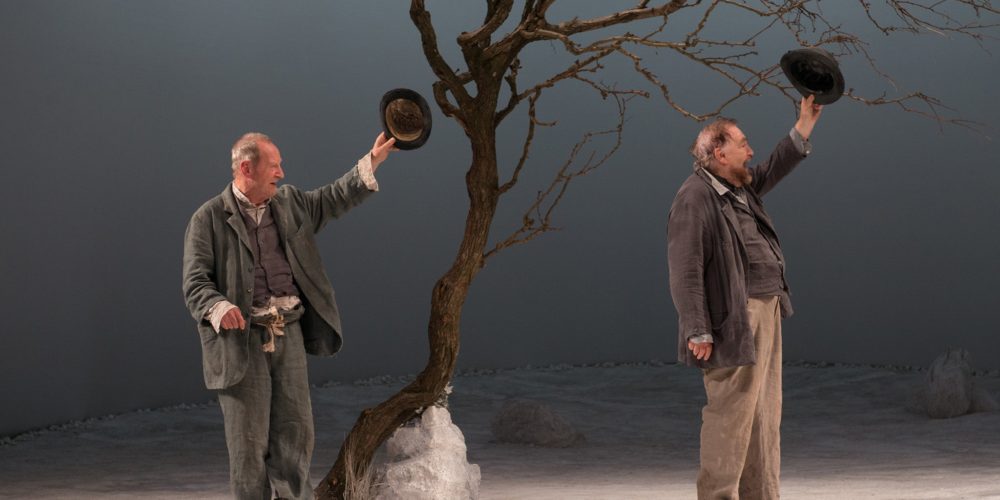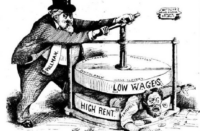Great Carthage waged three wars. It was still powerful after the first, habitable still after the second. Gone without trace after the third.
Bertolt Brecht (1951)
Samuel Beckett died thirty years ago, on 22 December 1989. He received the Nobel Prize for Literature fifty years ago, in 1969.
Arguably Beckett’s most famous play is Waiting for Godot. Typically, when this play is presented today the comedy of it is emphasised, as is its “absurdist” label, suggesting that life is meaningless. Beckett had moved permanently to France in the late 1930s. After the outbreak of the Second World War he remained in Paris, where he joined the Resistance following the Nazi invasion of France.
From 1947 on, Beckett wrote primarily in French. Waiting for Godot, written in 1948, is no exception. The Second World War was just over.
Although this is not specifically stated, Beckett’s play presents the audience with a post-nuclear-war scene. The stage is practically empty except for a country road and a bare tree. In this landscape two characters, Vladimir (Didi) and Estragon (Gogo), just about exist. These two men struggle to perform the most elementary actions, such as taking off a shoe. They sleep rough and are regularly beaten up by gangs at night. This is so commonplace that they barely comment on it. The human experience is reduced to simply staying alive and performing, with effort, the simplest actions.
In 1948, after the war and the nuclear carnage of Hiroshima and Nagasaki, people had almost come to the end of their humanity and any positive human experience.
In Waiting for Godot there is no prospect of action. The entire play presents us with the two main characters doing nothing and waiting in vain. Narratives that were once useful for endorsing human goodness have all been stripped of their meaning, including a clearly vain hope for God(ot) to arrive. In fact waiting for God(ot) prevents any movement out of this state. When a boy appears to tell them that Godot is not coming today, Estragon refers to himself as Adam. Humankind has become what Shakespeare’s King Lear refers to when he speaks of the most destitute: a “poor, bare, forked animal.”
When the character Pozzo appears, with his slave, which is a nod to the existence of a “master” class, he sees Gogo and Didi and comments: “You are human beings none the less . . . Of the same species as myself . . . Made in God’s image!” Any aspiration to godlike form and intellect has been annulled, or perhaps the reverse applies: God is this.
Thinking is an effort. On one occasion Didi and Gogo contemplate suicide by hanging themselves from the bare tree (of life?). One reason they do not do this is that one of them may remain alive and therefore alone. That is a fate worse than death. “I remain in the dark.” This gives some hope. Two characters are, after all, a small community, and they do help each other survive.
And when Pozzo asks Gogo and Didi for help in getting to his feet they respond to this with “It is not every day that we are needed.” This profound statement acknowledges that Pozzo’s call for help is addressed to “all of mankind,” and “at this place, at this moment of time, all mankind is us, whether we like it or not.” Ironically, all four men end up on the ground, and their cries for help go unheeded. Standing upright has become impossible. Purposeful labour and action no longer define us.
Beckett’s play is of immediate relevance to the world today. Like Brecht, Beckett warns of the ultimate destruction of humanity. He does not give his audience much hope. All we can do is take this message to heart and change the world.






